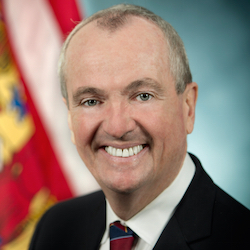
New Jersey Gov. Phil Murphy has signed a legislative package meant to address issues in the long-term care industry, including wages for frontline workers and response coordination for infectious disease outbreaks. One industry association, however, maintains that the minimum wage increase that is part of the package amounts to an “unfunded mandate.”
The package, which includes three bills affecting assisted living, came out of recommendations made in Manatt Health’s review of the state’s long-term care facilities, and it has bipartisan support. Manatt Health was hired by Murphy to develop a short- and long-term strategy to improve the coronavirus response at the state’s nursing homes.
Assembly Bill 4476 establishes a Long-Term Care Emergency Operations Center in the New Jersey Department of Health. The LTCEOC will serve as the centralized command and resource center for response and communications during infectious disease outbreaks, epidemics and pandemics affecting long-term care facilities, including assisted living communities.
The Department of Health will oversee the LTCEOC, with assistance from the New Jersey Department of Human Services and will include representatives from long-term care facilities, county boards of health, the Office of the New Jersey Long-Term Care Ombudsman and the Office of Emergency Management in the New Jersey State Police, as well as experts in public health, infection control, elder affairs, disability services, emergency response and medical transportation. Long-term care facilities will be partnered with first responder and medical transportation services during disaster response.
The law also requires the commissioners of Health and Human Services to ensure that federal funding given to the state for COVID-19 response efforts is made available to long-term care facilities that are complying with preparedness and response guidance.
“There is no question that New Jersey’s long-term care facilities were amongst the hardest hit by the COVID-19 pandemic, and they were also severely underprepared and unequipped for the challenges of this outbreak,” said Valerie Vainieri Huttle (D-Bergen), chairwoman of the Assembly Aging and Senior Services Committee. “In the face of these tragedies, we must act swiftly to ensure that our long-term care facilities have the tools that they need to navigate future emergencies. This new law will codify the formation of a Long Term Care Emergency Operations Center, a critical step in reforming our long term care infrastructure and emergency response.”
“While we certainly are not the only state dealing with outbreaks in our long term care facilities, without adequate staffing, protection equipment, emergency response plans or central channels of communication with health officials, long-term care facilities were at a disadvantage and simply unequipped to keep residents and staff safe in the early critical days of the pandemic,” Assembly Majority Leader Lou Greenwald (D) said. “Though no one could have predicted the toll COVID-19 would take, going forward, a centralized command center devoted to long-term care will help us make sure these facilities have the resources they need to prepare for and respond to emergencies.”
Assembly Bill 4481 established the New Jersey Task Force on Long-Term Care Quality and Safety, which will develop recommendations to improve in person-centered care, resident and staff safety, quality of care and services, and workforce engagement and sustainability in long-term care facilities. Membership on the task force will include a representative of a not-for-profit assisted living community.
Assembly Bill 4482 establishes minimum wage requirements for certain long-term care direct care staff, including those who provide personal care, assistance or treatment services directly to residents. The bill requires these direct care staff members to be paid $3 more than the prevailing minimum wage.
Jon Dolan, president and CEO of the Health Care Association of New Jersey, the state affiliate of Argentum and American Health Care Association / National Center for Assisted Living, called the minimum wage increase an “unfunded mandate. HCANJ lobbied to exempt assisted living and others not funded in the state’s emergency relief bill for long-term care.
Dolan said HCANJ is pushing the state for a $30 million lump sum emergency package from the CARES Act relief funding to “bear some of the burden” of COVID-19 expenses.
“We are fighting hard for a large Medicaid increase and COVID relief package to bear the brunt of the minimum wage increase and other COVID costs that impacted assisted living just as massively as nursing facilities, but with much less relief from the federal government,” Dolan told McKnight’s Senior Living.
Deputy Majority Leader Tom Giblin (D-Essex) said the increase in wages will address “staffing shortages and retention issues in long-term care facilities.”
“Providing pay increases will undoubtedly attract quality workers to the profession and help facilities retain their staff, which in turn will ensure residents are better cared for,” Giblin said
LeadingAge New Jersey & Delaware President and CEO Jim McCracken said he worked with the Legislature and other industry leaders on these bills and “will continue to advocate for providers and residents as regulations are drafted.”




